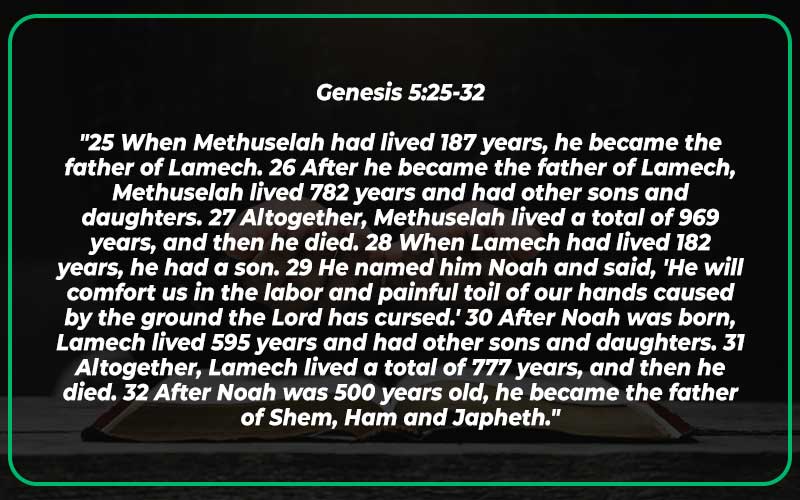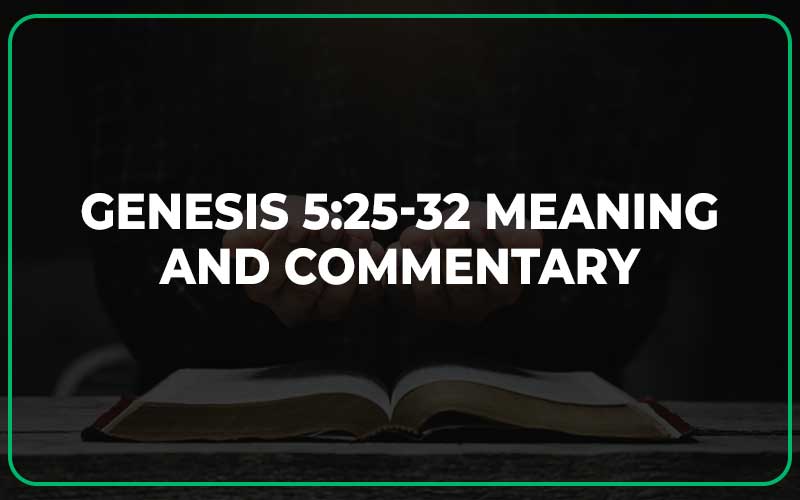Genesis 5:25-32
“25 When Methuselah had lived 187 years, he became the father of Lamech. 26 After he became the father of Lamech, Methuselah lived 782 years and had other sons and daughters. 27 Altogether, Methuselah lived a total of 969 years, and then he died. 28 When Lamech had lived 182 years, he had a son. 29 He named him Noah and said, ‘He will comfort us in the labor and painful toil of our hands caused by the ground the Lord has cursed.’ 30 After Noah was born, Lamech lived 595 years and had other sons and daughters. 31 Altogether, Lamech lived a total of 777 years, and then he died. 32 After Noah was 500 years old, he became the father of Shem, Ham and Japheth.”
Genesis 5:25-32 Meaning
The Bible verses in Genesis 5:25-32 tell us about the life of Methuselah, who was one of the descendants of Adam. Methuselah lived for an incredibly long time, 969 years to be precise, making him the longest living human being in recorded history. These verses also provide a genealogical record of Methuselah’s family, including information about his son Lamech, and his grandson Noah.
Explanation and Commentary on Genesis 5:25-32
In Genesis 5:25-32, we encounter the genealogy of Adam through his son Seth. This passage primarily focuses on the life of Methuselah, who is notably recorded as the longest-lived person in the Bible, living for 969 years.
The genealogies in the book of Genesis often serve as more than just a list of names and ages. They provide us with a historical record and lineage of significant figures in the Old Testament. In this passage, Methuselah stands out not only for his exceptional lifespan but also for his place in the lineage leading to Noah, who plays a pivotal role in the narrative of the Flood in Genesis.
Methuselah’s life spanned an extraordinarily long period, during which society was undergoing immense changes. It’s fascinating to consider the stories he might have heard from his grandfather, Adam, about the early days in the Garden of Eden, which would have provided a unique perspective on humanity’s beginnings.
The text doesn’t give us many specific details about Methuselah’s life or character, but his longevity symbolizes God’s patience and mercy. Scripture often emphasizes the brevity of human life (Psalm 39:4-5) and the importance of living in righteousness before God (Ecclesiastes 12:13). However, Methuselah’s extended years could also be seen as a form of God’s grace, allowing time for repentance and redemption.
Methuselah’s death occurs just before the Flood, which brings to mind the significance of his lifespan in relation to the impending judgment. His passing serves as a prelude to the catastrophic event of the Flood and highlights the faithfulness of God’s warning and judgment upon humanity’s wickedness (Genesis 6:5-8).
Through this passage, we’re reminded of the continuity of God’s plan throughout generations. Each individual in this genealogy played a part in God’s unfolding story, leading ultimately to the preservation of humanity through Noah’s family.
As we reflect on Methuselah’s life, we are encouraged to consider our own mortality and the importance of living faithfully before God in the time we have been given. Just as Methuselah lived in a time of great change and uncertainty, we too live in a world where we must remain steadfast in our faith and obedience to God’s will.
Context of Genesis 5:25-32
The genealogy recorded in Genesis 5 provides a comprehensive account of the descendants of Adam and Eve up until Noah’s generation. This genealogy helps us understand the continuity of God’s plan throughout history, even in the midst of humanity’s increasing wickedness.
Leading up to these verses, Genesis 5 outlines the lifespan of other individuals from Adam to Noah’s father, Lamech. Adam, for instance, lived for 930 years, while Lamech lived for 777 years. Methuselah’s record-breaking lifespan stands out within this genealogy, drawing our attention to the upcoming events involving Noah and the great flood.

Breaking Down the Key Parts of Genesis 5:25-32
“Methuselah lived 187 years and fathered Lamech” (Genesis 5:25): Methuselah’s significance lies not only in his age but also in his role as the father of Lamech, who, in turn, becomes the father of Noah. This intergenerational connection highlights the impact that Methuselah’s lineage had on the unfolding of God’s plan.
“Methuselah lived 969 years… and he died” (Genesis 5:27): While the exact reason for Methuselah’s exceptional lifespan is not explicitly stated, his death serves as a reminder that even the longest human life is finite. It emphasizes the brevity of our existence compared to God’s eternal nature.
“Lamech was 182… and he had Noah” (Genesis 5:28-29): Lamech’s age at the birth of Noah further emphasizes the progression of generations within the genealogy. Each person mentioned in this lineage plays a role in advancing God’s plan, with Noah being the pivotal figure in the story.
Bible Study on Genesis 5:25-32
Studying Genesis 5:25-32, we can see some lessons from these verses which include
1. Longevity: The long lifespans of those in the early generations of humanity reflect the goodness of God’s creation and the effects of sin not fully manifesting yet. However, our ultimate hope is not found in long life on earth but in eternal life through faith in Jesus Christ (John 3:16).
2. God’s Plan: As we look at this genealogical record, we see God’s sovereignty at work even in the midst of human frailty. Each person mentioned has a purpose within the bigger picture of God’s plan. This reminds us that our lives, no matter how long or short, are significant in God’s eyes.
3. Noah’s Faithfulness: Methuselah’s descendants continued to follow God despite the surrounding wickedness. Noah, in particular, found favor in the eyes of the Lord and was chosen to bring forth a remnant of humanity after the flood. This serves as a lesson for us to remain faithful to God in a world that may often be steeped in sin.
Also Read: Genesis 4:20-26 Meaning and Commentary
Biblical Translations of Genesis 5:25-32
Genesis 5:25-32 King James Version (KJV)
“25 And Methuselah lived an hundred eighty and seven years, and begat Lamech: 26 And Methuselah lived after he begat Lamech seven hundred eighty and two years, and begat sons and daughters: 27 And all the days of Methuselah were nine hundred sixty and nine years: and he died. 28 And Lamech lived an hundred eighty and two years, and begat a son: 29 And he called his name Noah, saying, This same shall comfort us concerning our work and toil of our hands, because of the ground which the Lord hath cursed. 30 And Lamech lived after he begat Noah five hundred ninety and five years, and begat sons and daughters: 31 And all the days of Lamech were seven hundred seventy and seven years: and he died. 32 And Noah was five hundred years old: and Noah begat Shem, Ham, and Japheth.”
Genesis 5:25-32 English Standard Version (ESV)
“25 When Methuselah had lived 187 years, he fathered Lamech. 26 Methuselah lived after he fathered Lamech 782 years and had other sons and daughters. 27 Thus all the days of Methuselah were 969 years, and he died. 28 When Lamech had lived 182 years, he fathered a son 29 and called his name Noah, saying, ‘Out of the ground that the Lord has cursed, this one shall bring us relief from our work and from the painful toil of our hands.’ 30 Lamech lived after he fathered Noah 595 years and had other sons and daughters. 31 Thus all the days of Lamech were 777 years, and he died. 32 After Noah was 500 years old, Noah fathered Shem, Ham, and Japheth.”
Genesis 5:25-32 New Living Translation (NLT)
“25 Methuselah was 187 years old when his son Lamech was born. 26 After the birth of Lamech, Methuselah lived another 782 years, and he had other sons and daughters. 27 Methuselah lived 969 years, and then he died. 28 Lamech was 182 years old when his son was born. 29 He named his son Noah, for he said, ‘He will bring comfort to our painful labor caused by the ground the Lord has cursed.’ 30 After the birth of Noah, Lamech lived another 595 years, and he had other sons and daughters. 31 Lamech lived 777 years, and then he died. 32 After Noah was 500 years old, he became the father of Shem, Ham, and Japheth.”
Genesis 5:25-32 New King James Version (NKJV)
“25 Methuselah lived 187 years, and begot Lamech. 26 After he begot Lamech, Methuselah lived 782 years, and had sons and daughters. 27 So all the days of Methuselah were 969 years; and he died. 28 Lamech lived 182 years, and had a son. 29 And he called his name Noah, saying, ‘This one will comfort us concerning our work and the toil of our hands, because of the ground which the Lord has cursed.’ 30 After he begot Noah, Lamech lived 595 years, and had sons and daughters. 31 So all the days of Lamech were 777 years; and he died. 32 And Noah was five hundred years old, and Noah begot Shem, Ham, and Japheth.”
Genesis 5:25-32 Christian Standard Bible (CSB)
“25 Methuselah was 187 years old when he fathered Lamech. 26 And Methuselah lived 782 years after the birth of Lamech, and he fathered other sons and daughters. 27 So Methuselah’s life lasted 969 years; then he died. 28 Lamech was 182 years old when he fathered a son. 29 And he named him Noah, saying, ‘This one will bring us relief from the agonizing labor of our hands, caused by the ground the Lord has cursed.’ 30 Lamech lived 595 years after Noah’s birth, and he fathered other sons and daughters. 31 So Lamech’s life lasted 777 years; then he died. 32 Noah was 500 years old, and he fathered Shem, Ham, and Japheth.”
Genesis 5:25-32 The Message (MSG)
“25 Methuselah lived 187 years. He had Lamech. 26 Methuselah lived an additional 782 years, having more sons and daughters. 27 Methuselah lived a total of 969 years. And he died. 28 Lamech lived 182 years. Then he had a son. 29 He named him Noah, saying, ‘This child will ease our troubles and our hard work, coming from the ground that the Lord cursed.’ 30 After Noah was born, Lamech lived another 595 years, having more sons and daughters. 31 Lamech lived a total of 777 years. And he died. 32 After Noah was 500 years old, he had Shem, Ham, and Japheth.”
Final Thoughts
The genealogical record of Methuselah in Genesis 5:25-32 invites us to reflect on the broader narrative of God’s redemptive plan. While Methuselah’s age is remarkable, it is the continuation of the lineage through his grandson Noah that truly holds significance.
These verses teach us that every generation has a role to play in God’s plan, and our faithfulness matters, no matter how long or short our lives may be. Let us be encouraged by the example of Noah and his ancestors, trusting in God’s faithfulness and purpose for our lives.

